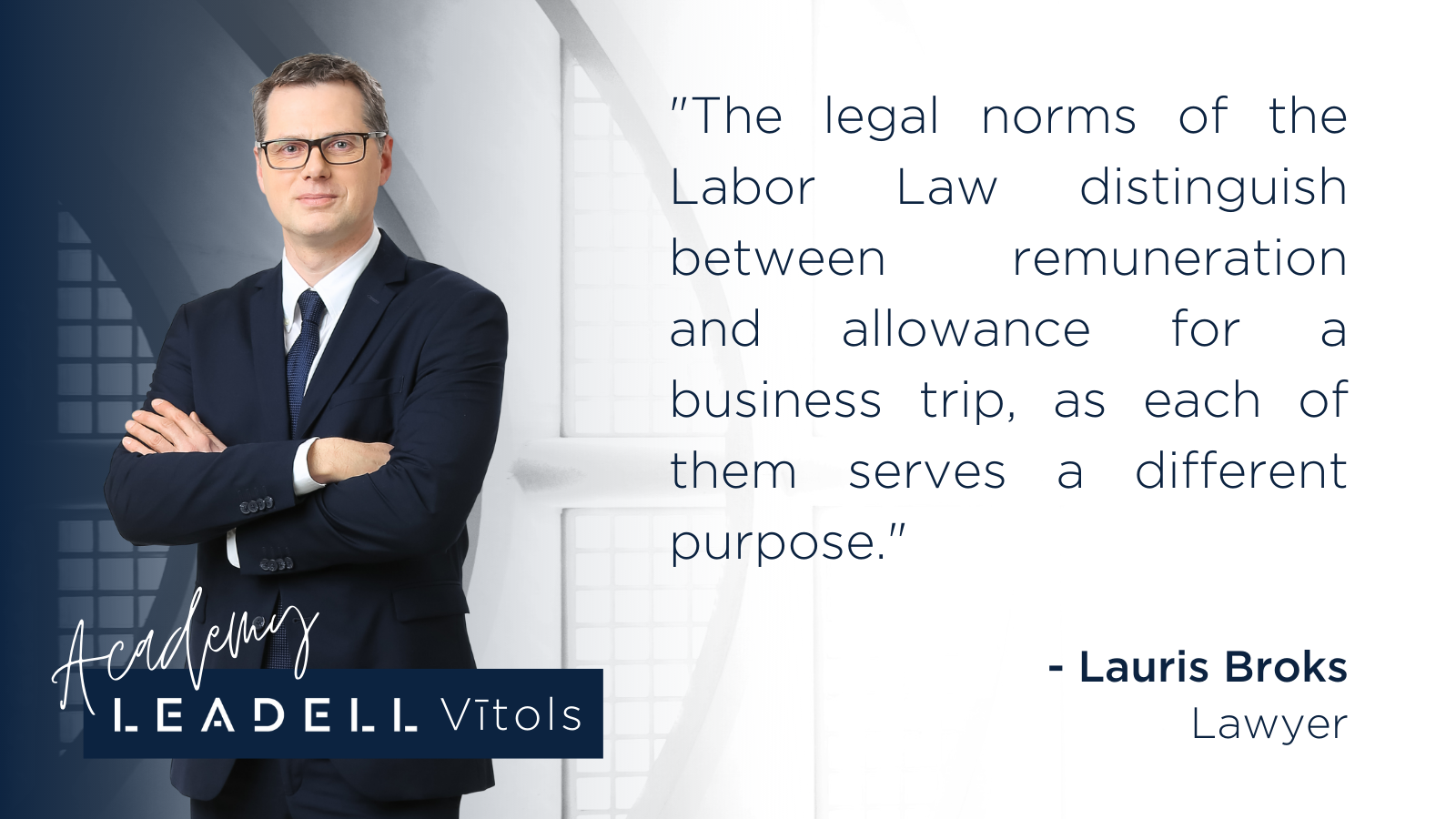News
Can the daily allowance paid to the employee be considered as part of the wage? | LEADELL Academy
In the framework of cooperation with the magazine iFinance, Lauris Broks – LEADELL Vītols lawyer – analyzes whether an allowance for a business trip can be considered remuneration and in which cases can the daily allowance paid to an employee be considered as part of his wage. In this regard, let’s delve into a court case in which the opinions of the employer and the employee on the matter were complete opposites.
On January 20, 2022, adjudicating the case No. SKC-52/2022 in the employee’s claim against the employer in connection with the cassation appeal of the applicant against the judgment of the Riga Regional Court Civil Division of September 3, 2020, the Department of Civil Cases of the Senate decided to set aside the judgment of the appellate court and to remit the case to the appellate court.
Substance
The employee who worked as a construction electrician with his principal workplace in Copenhagen, Denmark, and who had an aggregate working time of three months and a salary of EUR 11 per hour, had brought an action in the present case against his employer for recovery of unpaid remuneration.
The claim was based on the fact that, following the employment contract, the wage shall be determined as the amount of money that the employee receives for the work after payment of all prescribed taxes, including all supplements, daily allowances, and compensations prescribed by law. The applicant had stated that, although he had been paid a total of EUR 11 355 for his work, a part of that sum – EUR 6 768 – had been paid as a daily allowance for a business trip. Thus, the remuneration had been paid only in part – in the amount of 4587 euros. According to the applicant, per the employer’s obligation under Section 76 of the Labor Law (LL) to reimburse expenses incurred in connection with a business trip or a work trip of the employee and pursuant to the concept of remuneration under Section 59 of the LL, the daily allowance for a business trip should not be regarded as included in the wage (agreed rate). The applicant stipulated that the wage calculation receipts exemplify that the defendant did not record the agreed remuneration of 11 euros per hour as a remuneration, as most of the calculated amounts are allowance for a business trip for which the mandatory state social insurance contributions have not been paid.
Judgment of the Riga Regional Court
After examining the case in connection with the employer’s appeal against the judgment of the court of the first instance, the Chamber of the Civil Cases of the Riga Regional Court dismissed the claim by a judgment on 3 September 2020. The Court stated that the manner in which the rate of remuneration appropriate to the recipient State and the reimbursement of posting expenses may be agreed by the parties in the employment contract, subject to the provisions of Section 6 (1) of the LL, namely, provisions that, contrary to laws and regulations, erode the legal status of an employee shall not be valid.
Referring to the judgment of the Court of Justice of the European Union (CJEU) of 12 February 2015 in case C-396/13, the CJEU pronounced that the daily allowance shall be considered as a subsistence allowance within the meaning of Article 7 (2) of the Directive 96/71/EC of the European Parliament and of the Council of 16 December 1996 concerning the posting of workers in the framework of the provision of services. In contrast, the second subparagraph of Article 3 (7) of that Directive provides that allowances specific to the posting shall be considered to be part of the minimum wage, unless they are paid in reimbursement of expenditure actually incurred on account of the posting, such as expenditure on travel, board, and lodging.
Finding that the employer could include the daily allowance within the wage under Danish law and that the sums shown in the wage calculation as a daily allowance had not been paid to the applicant as reimbursement of actual travel, board and lodging expenses, the Riga Regional Court found that that the defendant has paid the applicant the full amount of wages in accordance with the terms of the employment contract.
When assessing the hourly rate set for the applicant at 11 euros (net) in comparison with the amount of wages in the construction sector in Denmark, which is 16 euros (gross), the Riga Regional Court stated that there was no disproportion in the Danish labor market in the applicant’s field of employment.
Appeal in cassation
An employee filed a cassation appeal against the judgment of the Chamber of Civil Cases of the Riga Regional Court on 3 September 2020, requesting that the judgment be set aside and the case re-examined for several reasons.
The provisions of Latvian law were to be primarily applicable in the case, which provides that the daily allowance is not a part of the wage. The LL makes a clear distinction between the concept of remuneration in Section 59 of the LL and the concept of expenses of employees in Section 76. Additionally, the parties had agreed in the employment contract that in case of any disputes, Latvian law will be considered decisive. Henceforth, the court should have assessed whether the applicable international and Danish law did not create a conflict with Latvian law in the relevant field and which national norms were more favorable to the applicant. According to Recital 23 in the Preamble to Regulation (EC) No 593/2008 of the European Parliament and of the Council of 17 June 2008 on the law applicable to contractual obligations (Rome I), for contracts concluded with parties regarded as being weaker, those parties should be protected by conflict-of-law rules that are more favorable to their interests than the general rules.

The action was not brought for the provision of the minimum wage, therefore the court has assessed this aspect without justification and has referred to the case law on this issue. It is erroneous to consider the daily allowance as part of the minimum wage. In such a case, Section 14.2 of the LL would become meaningless.
According to the judgment of the CJEU of 12 February 2015 in Case C-396/13, not every daily allowance is part of the minimum wage, but only a daily allowance such as that in the case, whereas a preliminary ruling on certain collective labor agreements has been given. The issue addressed in the present case is different and does not relate to the subject matter of this action.
Perhaps, the daily allowance could be included in the wage if the money paid were being subject to taxes. Otherwise, it is an “envelope” wage from which pension, sickness, and social benefits are not calculated. Such an action of the employer erodes the situation of the employee and distorts the labor market because the employer does not pay all the payroll taxes by replacing the remuneration with an allowance for a business trip.
Judgment of the Senate
After examining the employee’s cassation complaint against the judgment of the Riga Regional Court, the Senate indicated in its judgment that there was no dispute in the case that the applicant’s actual expenses incurred in connection with the posting had been covered. Nor is it disputed that the applicant’s daily allowance was not paid as a supplement. The Riga Regional Court had established that, in accordance with Danish law, the employer may include the daily allowance in the wage. Consequently, contrary to what was indicated in the cassation complaint, the Senate acknowledged that in the specific case the daily allowance paid to the applicant could be considered as a part of the minimum wage rate within the meaning of Section 14.2 of the LL. However, this is not sufficient to establish that the dispute has been resolved without flaws.
The Senate pointed out that one of the essential and mandatory components of an employment contract is wage. In turn, remuneration as one of the essential components of an employer’s offer plays a role in an employee’s decision to enter into an employment relationship.
The Senate confirmed that in the legal norms of LL a distinction has been made between remuneration and allowance for a business trip, as each of them serves a different purpose and has a distinct basis for payment. The concept of remuneration generally used in an employment contract must be interpreted in accordance with the concept of remuneration within the meaning of Section 59 of the LL, namely, remuneration for work performed which cannot include daily allowance or allowance for a business trip, since it is not part of remuneration.
In the opinion of the Senate, the opposite interpretation would lead to a violation of Section 28 (2) of the LL, as the employee would be unable to know an essential part of the employment contract – the amount of remuneration – as well as would be aimed at circumventing the tax legal regulation, as the object of personal income tax and mandatory state social insurance contributions would be reduced, thus, eroding the position of the employee contrary to the law.
The Senate acknowledged that the court had not considered the claim on the basis set out therein, focusing only on the proportionality of the amount of the posted worker’s remuneration with the wage in the relevant sector in Denmark.
The Senate stipulated that according to the action brought before the court, it was necessary to assess whether the provision stipulated in the employment contract that the daily allowance (allowance for a business trip) is included in the remuneration (wage) and to realize the intention of the parties – what remuneration and what elements of it were agreed between the parties, in particular, whether, in the circumstances, the employee could have understood the agreed remuneration within the meaning of Section 59 of the LL.
As the Riga Regional Court, in the opinion of the Senate, has not fulfilled this obligation, the appealed judgment has been set aside in the part regarding the recovery of remuneration and the case has been remanded to the appellate court.
What to do in case of uncertainties?
LEADELL Vītols team actively provides professional support in labor law matters to clients. Entrust these and other labor law issues to us: riga@leadell.com
Lawyer Lauris Broks shared his knowledge at the LEADELL Academy and he would be pleased to help you in finding solutions to issues arising from employment relations.
Categories
Subscribe to Leadell's Newsletter







